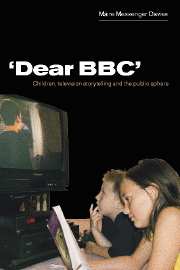Book contents
- Frontmatter
- Contents
- List of tables
- Acknowledgements
- Introduction
- Part I Broadcasting institutions and childhood
- Part II The social functions of broadcasting
- 5 The Reithian agenda: Setting good examples (with David Machin)
- 6 Censorship
- 7 Aspects of identity
- Part III The art of television
- Conclusion: children and television drama – narrative closure?
- Appendix 1
- Appendix 2
- References
- Index
5 - The Reithian agenda: Setting good examples (with David Machin)
Published online by Cambridge University Press: 12 October 2009
- Frontmatter
- Contents
- List of tables
- Acknowledgements
- Introduction
- Part I Broadcasting institutions and childhood
- Part II The social functions of broadcasting
- 5 The Reithian agenda: Setting good examples (with David Machin)
- 6 Censorship
- 7 Aspects of identity
- Part III The art of television
- Conclusion: children and television drama – narrative closure?
- Appendix 1
- Appendix 2
- References
- Index
Summary
Well we wanted to choose Friends, but we did not think it would be a good one for young children and The X Files is for grown ups and it may scare younger children.
Boy, 12, secondary school, OxfordshireI think that The X Files has to go because Live and Kicking has got lots of programmes in it. EastEnders – everybody likes that, Top of the Pops because it has got lots of songs on it and everyone likes that and Men Behaving Badly because it is comedy and lots of people like that as well. The X Files is too scary for the little kids that are watching it.
Girl, 9, primary school, BuckinghamshireI don't think you should get rid of EastEnders. It's about people, it's a drama. It's just about people and you learn things when you're older about growing up.
Girl, 10, primary school, Milton KeynesAnthropologists, such as Evans-Pritchard (1937) and Geertz (1973), have drawn attention to the ways in which cultures have different available representations for discussing social and cultural phenomena. These representations may often be contradictory and have no direct relationship with the actual topic of conversation, but they form a body of usable and accepted public knowledge on which to draw in discussion. One of the ways in which we approached the discussion data in the BBC study was to analyse it to see what kinds of available cultural representations about ‘being a viewer’, or ‘being a child’, or ‘being a spokesperson’, or ‘being in charge’ were used by children.
- Type
- Chapter
- Information
- 'Dear BBC'Children, Television Storytelling and the Public Sphere, pp. 127 - 145Publisher: Cambridge University PressPrint publication year: 2001

